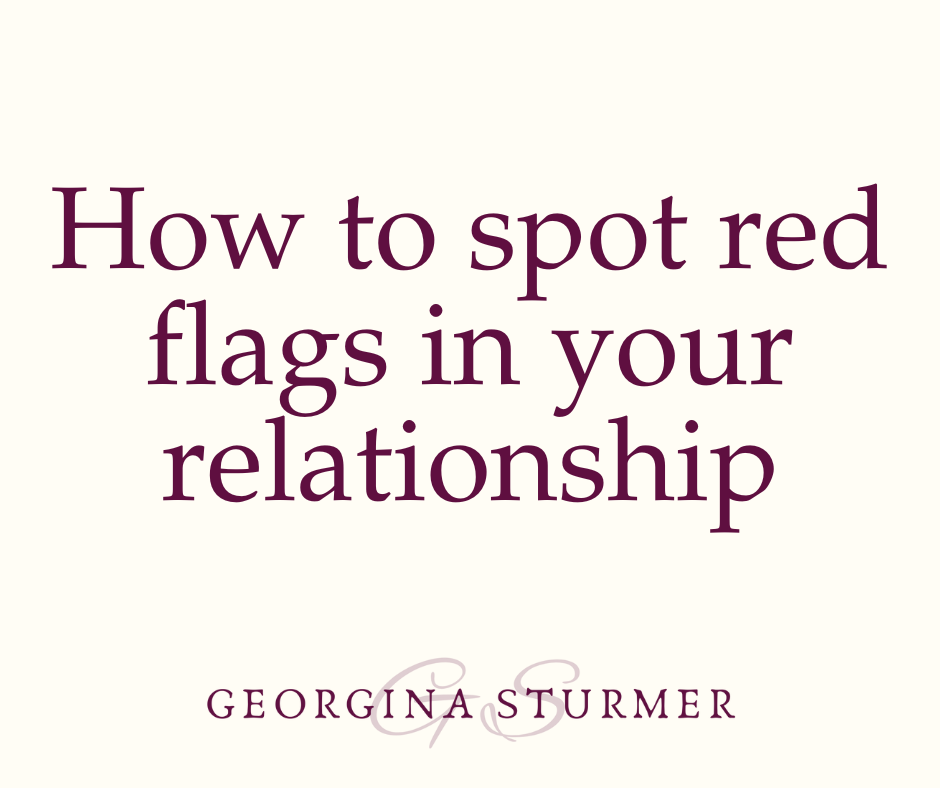How to spot red flags in your relationship
- Georgina Sturmer

- Sep 7, 2025
- 3 min read
I spend a lot of time talking and thinking about our 'gut' feelings. Those spidey senses that things aren't quite right in our lives or our relationships. And when we think about 'red flags', we imagine that they might be obvious. Waving brightly in the wind, ready for us to stand up and take notice.
But that's not always the case. In some instances, it can take a while for subtle changes in our relationships to become more noticeable red flags. And by that time, we might be too emotionally invested, or connected with them in ways that make it hard for us to walk away.
In other instances - especially if we struggle with our self-esteem - we might notice red flags, but we might not feel that we have the right to act on them. Especially if we are used to putting our partner's needs before our own.
I spoke to Yahoo News all about relationship red flags. Click here to read the full article - and read on to learn what to watch out for in your relationships.
1/ A desire for control
Controlling behaviour comes in many forms. And it doesn't always look the way we expect. It can be overt, with a partner controlling your finances or your choice of clothing. Or it might be more subtle, with a partner making you feel guilty for making certain choices, or planting doubts and beliefs that linger even when they're not around.
Ask yourself:
Do I feel free to make decisions without feeling guilty or stressed?
Do I have a sense of privacy?
If the answer is no, then it could be a sign of a shifting power balance in your relationship, and that your partner is starting to take control.
2/ Jealousy
It might feel like flattery if your partner shows a jealous streak, especially if you have experienced rejection, or if you are prone to low self-esteem. But if a partner starts showing signs of jealousy, it can lead to anger or mistrust. And jealousy isn't just about seeing you chat to someone they view as a threat. Jealousy might be about your friendships, your career, or even your hobbies - anything that makes you happy or keeps you feeling independent. Anything that a partner might see as a threat to the relationship, or to their own sense of confidence.
3/ Lack of emotional support
There are key differences between being someone’s colleague or friend, or being in a relationship with them. And one of the main ones is the level of emotional support that we hope to receive from our partner. If you’re feeling down, or anxious, ask yourself how your partner responds. Are they attuned to what you need? If they dismiss your feelings, or even change the subject, this can leave you feeling low or lonely. Of course, nobody is perfect, and our partner won't always be perfectly emotionally attuned. And that's ok. In fact, the act of 'rupture and repair' can help to strengthen our relationships. But if they are consistently unable to show you the emotional support that you need, then it's a sign that something important is missing.
4/ Isolating you from your friends
When we are in a new relationship, it’s common to cocoon ourselves with our new partner. But as time goes by, we would expect to continue to nurture our friendships. Some red flags to watch for are if your partner:
Is unkind or negative about your friends or family
Puts pressure on you to cancel plans with other people
Suggests that other people don't understand you in the way that they do
This type of isolation isn't always sudden. It can be a gradual process - which can make it harder to challenge.
5/ Rude behaviour or unkindness towards others
Your partner may well treat you with kindness and respect. But it’s always worth considering how they treat others. Not just friends and family, but also the people who play a role in everyday life. Tradespeople, customer service staff, the waiting staff in a restaurant. A pattern of rudeness or lack of courtesy can be an early warning sign for how they could behave towards you in the future.
What if you’ve spotted red flags?
If any of these red flags strike a chord with you, it's natural to feel unsure about what to do next. If you are feeling concerned, you can contact Shout, the Samaritans, or the National Domestic Abuse Helpline (all available 24/7).
Counselling can offer a space for you to take a deeper look at what's happening in your relationships. Click here to contact me, or click here to book a 30-minute introductory call.
If you'd like to read more about these subjects, you might find my blogs about the 'Drama Triangle' or the 'Parent-Adult-Child' model interesting.




Comments